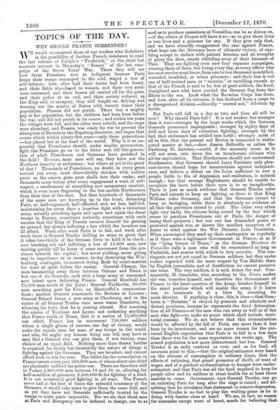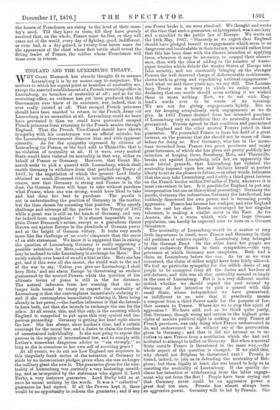TOPICS OF THE DAY.
WHY SHOULD FRANCE SURRENDER ?
WE would recommend those of our readers who disbelieve in the possibility of further French resistance to read the last volume of Carlyle's "Frederick," or the short but accurate account in Macaulay's "Essays" of the last cam- paign of the Seven Years' War. There they will see how these Prussians, now so indignant because Paris keeps their troops encamped in the cold, waged a war of self-defence ; how, after half their towns had been burnt, and their fields abandoned to women, and their very seed- corn consumed, and their horses all carried off for the guns, and their police at an end, and their society reduced, as the King said, to savagery, they still fought on, defying and wearing out the armies of States with twenty times their population. Prussia did not perish. There was a mighty gap in her population, but the children had been born before the war, and did not perish in its course ; and within ten years the villages were full, and the cities were rebuilt, and the crops were abundant, and Prussia was ready for war to prevent the absorption of Bavaria in the Hapsburg dominion, and began that career which within ninety-five years—only three generations —has placed her at the head of the world. Why is it so im- possible that Frenchmen should, under similar provocation, fight like Prussians, go on to the bitter end, till this genera- tion of adult Frenchmen and Germans have perished in the field ? Because, most men will say, they have not the Northern tenacity or endurance ; but where as yet is the proof of that ? Thousands of Frenchmen, no doubt, in every great contest run away, most discreditably stricken with sudden panic as the unseen guns pour shells into their ranks ; and thousands more betray after every engagement a want of self- respect, a carelessness of everything save momentary comfort, which is even more disgusting to the less mobile Northerners than their fear of the shot. But then hundreds of thousands of the same men are hurrying up to the front, defending Paris, or, half-organized, half-officered, and, we fear, half-fed, maintaining for seven days a hopeless fight with a victorious army, actually attacking again and again and again the finest troops in Europe, sometimes uselessly, sometimes with such success that the King of Prussia excuses himself for gaining no ground, but always inflicting a loss which the invaders can ill afford. Week after week Paris is to fall, and week after week there is General Trochu drilling an army so great that it takes two-thirds of the German force to hold it in check ; now breaking out and inflicting a loss of 15,000 men, now waiting quietly till he hears of some movement from the pro- vinces towards the capital ; but never yielding, never giving way to impatience or to menace, to-day destroying the Witr- temberg contingent, to-morrow trying Reds by court-martial for want of spirit before the enemy. General Chanzy, the man hammering away there between Orleans and Tours, is but one of six Generals, each with a large army at command, now intent upon delivering France. General Bourbaki has 75,000 men south of the Loire ; General Faidherbe, 30,000 men marching past La Fere, on Mauteuffel's communica- tions ; another General commands the Bretons at Lemans ; General Briand forms a new army at Cherbourg, and in the centre of all General Trochu once more warns Gambetta, by silencing his forts, that he is coming abroad. Not counting the armies of Toulouse and Lyons, not reckoning anything that France south of Tours, that is a nation of 15,000,000 can effect, France has in movement 750,000 soldiers whom a single gleam of success, one day of victory, would make the equals, man for man, of any troops in the world, and who, for aught any human being can tell, may have or may find a General who can give them, if not victory, some chance of an equal field. Nothing more than drawn battles is required, for slowly but irresistibly the nature of things is fighting against the Germans. They are invaders, and cannot afford even to win for ever. The ballot for the conscription in France covers every year 360,000 men, of whom about one-third are physically unfitted for active war. There are therefore still in France 2,800,000 men between 18 and 30, or, allowing for half-a-million of prisoners, 2,300,000 fit for fighting of a kind. It is not necessarily good fighting in all ways. The French never had at the best of times the splendid constancy of the Germans, it would take years to give them the same drill, and as yet they have not Generals sufficiently trusted by the troops to make panic impossible. But we see that these men at Paris and Beaugeney can be induced to charge, can be so used as to produce uneasiness at Versailles, can be so driven on, —if the critics of France will have it so—as to give three lives or two lives and a prisoner for one. If they give only that, and we have absurdly exaggerated the case against France, what hope can the Germans have of ultimate victory, of any- thing except to endure with patient heroism and an overplits of glory the slow, steady whittling away of their hammer of Thor. They are fighting even now four separate campaigns,. winning three of them, but losing every day, as every officer who has seen service must know, from one to two thousand men killed,. wounded, invalided, or taken prisoners ; and their loss is not one of half-trained men, or "recruits," or unwilling rascals, as that of the French is said to be, but of good soldiers, the hard; disciplined men who have carried the German flag from the Rhine to the sea. Look what the Bavarian Corps has done,. and how, after all its victories, it has declined from a corps to a disorganized division,—literally " warred out," debellata by battle.
But Paris will fall in a day or two, and then all will be over ? Why should Paris fall ? It is not weaker, but stronger than it was—stronger by the huge works which the German. Generals pronounce impregnable ; stronger by eighty days of drill and three days of victorious fighting; stronger by the fact that endurance has settled into habit ; stronger most of all in this, that the patient sad Breton in command is undis- puted master at last,—dare disarm Belleville or ration the Faubourg St. Antoine,—could, if the necessity arose, as it will not arise, rain down fire on treacherous citizens who. advise capitulation. That Northerners should not understand Southerners, that Germans should fancy Parisians only plea- sure-lovers, should hope for insurrections against independ- ence, and believe a defeat on the Loire sufficient to cow a. people liable to fits of depression and exultation, is natural enough ; but that average Englishmen should be unable to recognize the facts before their eyes is to us inexplicable.. There is just as much evidence that General Trochu roles. Paris and intends to keep on fighting, as there is that King, William rules Germany, and that the Germans intend to keep on besieging, while there is absolutely no evidence at all that the provinces intend to yield. The cities very often. fight very badly, the citizens being cowed by the fear which seems to paralyze Frenchmen out of Paris, the danger of losing their property ; but not one has demanded peace, or- protested against war, or shown the smallest symptom of a. desire to rebel against the War Dictator, Leon Gambetta. When unoccupied they send up their contingents as regularly as if there were a legitimate Government in France, or as if the " lying lawyer of Tours," as the German Moniteur de. Versailles calls a man who will be remembered as long as Frederick, had armies with which to levy recruits. The con- tingents are not yet equal to German soldiers, but they make rushes regarded with far more respect by Von Moltke than. by English journalists, and of disaffection we cannot perceive one trace. The very soldiers, it is said, detest the war. Con- sequently, M. Gambetta, who, according to the Times, makes. the war, transfers himself, and therefore the Government of France, to the head-quarters of the Army, betakes himself to. the exact position which will enable the army, if it hates- war, to terminate it at a blow by arresting its. main director. If anything is clear, this is clear—that Gam- betta is " Dictator," is obeyed by generals and admirals and distant provinces, because he represents the fixed determina- tion of all France—of the men who run away as well as of the men who fight—to make no peace which shall include terri- torial cessions. We do not believe that this determination. would be affected by the fall of Paris, any more than it has been by its investment, and see no more reason for the uni- versal English expectation that Paris is to fall in a few days than there was for the same expectation six weeks ago. The armed population is not more disheartened, but less. General Trochu is as sadly resolved as ever, and as for food, all accounts point to this,—that the original estimates were based. on the returns of consumption in ordinary times, that the effects of rationing, that grand promoter of thrift, of want of wages, and of a gradual acclimatization to hunger were under- estimated, and that Paris has all the food required to keep its people alive and its soldiers in stout health for at least three months to come. Government, says General Trochu, can go on rationing Paris for long after the siege is raised ; and ad- mitting that he circulates that statement to remove depression, General Trochu is no fool to play the waiting game as he is doing, with famine close at hand. We see, in fact, no reason for surrender except want of heart, much for believing that
the hearts of Frenchmen are rising to the level of their coun- try's need. Till they have so risen, till they have gravely resolved that, on the whole, France must be free, or they will cease out of the world, every day of fighting, good, indifferent, or even bad, is a day gained, is twenty-four hours more fer the appearance of the chief whose first battle shall reveal the fitting leader of France, the soldier whom Frenchmen will trust even in retreat.







































 Previous page
Previous page